| |||||||||||||||||
| |||||||||||||||||
 County results Kassebaum: 60–70% 70–80% 80–90% | |||||||||||||||||
| |||||||||||||||||
| Elections in Kansas |
|---|
 |
The 1990 United States Senate election in Kansas was held November 6, 1990. Incumbent Republican U.S. Senator Nancy Kassebaum was re-elected for a third full term.
| |||||||||||||||||
| |||||||||||||||||
 County results Kassebaum: 60–70% 70–80% 80–90% | |||||||||||||||||
| |||||||||||||||||
| Elections in Kansas |
|---|
 |
The 1990 United States Senate election in Kansas was held November 6, 1990. Incumbent Republican U.S. Senator Nancy Kassebaum was re-elected for a third full term.
| Party | Candidate | Votes | % | ||
|---|---|---|---|---|---|
| Republican | Nancy Kassebaum (Incumbent) | 578,605 | 73.60% | ||
| Democratic | Dick Williams | 207,491 | 26.40% | ||
| Republican hold | |||||
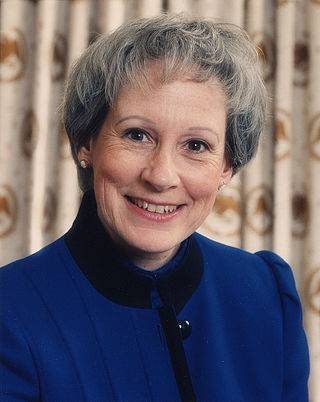
Nancy Josephine Kassebaum Baker is an American politician from Kansas who served as a member of the United States Senate from 1978 to 1997. She is the daughter of Alf Landon, who was Governor of Kansas from 1933 to 1937 and the 1936 Republican nominee for president, and the widow of former U.S. senator and diplomat Howard Baker.
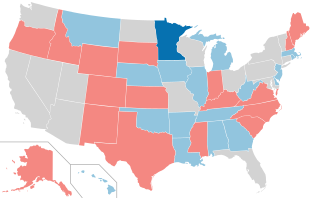
The 1990 United States Senate elections were held on Tuesday, November 6, 1990, with the 33 seats of Class 2 contested in regular elections. Special elections were also held to fill vacancies. The Democratic Party increased its majority with a net gain of one seat from the Republican Party. The election cycle took place in the middle of President George H. W. Bush's term, and as with most other midterm elections, the party not holding the presidency gained seats in Congress.

The 1984 United States Senate elections were held on November 6, with the 33 seats of Class 2 contested in regular elections. They coincided with the landslide re-election of President Ronald Reagan in the presidential election. In spite of the lopsided presidential race, Reagan's Republican Party suffered a net loss of two Senate seats to the Democrats, although it retained control of the Senate with a reduced 53–47 majority. Democrats defeated incumbents in Illinois and Iowa, and won an open seat in Tennessee, while Republicans defeated an incumbent in Kentucky.

The 1978 United States Senate elections were held on November 7, in the middle of Democratic President Jimmy Carter's term. The 33 seats of Class 2 were contested in regular elections. Special elections were also held to fill vacancies.
This article covers the history of women in the United States Senate and various milestones achieved by female senators. It includes a list of all women who have served in the Senate, a list of current female senators, and a list of states represented by women in the Senate. The first female U.S. senator, Rebecca Latimer Felton, represented Georgia for a single day in 1922, and the first woman elected to the Senate, Hattie Caraway, was elected from Arkansas in 1932. Sixty women have served in the upper house of the United States Congress since its establishment in 1789. As of October 3, 2023, there are 25 women serving as U.S. senators out of 100 possible seats. Additionally, Kamala Harris as vice president serves as President of the Senate.
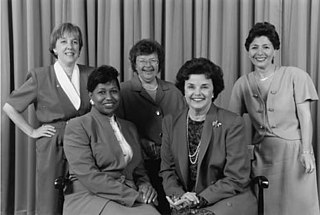
The Year of the Woman was a popular label attached to 1992 after the election of a number of female senators in the United States. The term has also been used with respect to the 2018 House elections, in which a record 103 women were elected, 90 of whom were Democrats.
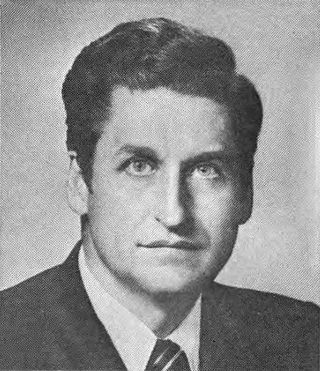
William Robert Roy, also known as Bill Roy, was a United States representative from Kansas, a physician, and a columnist for The Topeka Capital-Journal. He was the Democratic nominee for U.S Senator from Kansas in the 1974 and 1978 senate elections, but lost both races.

The 1996 United States Senate election in Virginia was held on November 5, 1996. Incumbent Republican U.S. Senator John Warner won re-election to a fourth term over Democratic challenger Mark Warner (unrelated), who later served as Governor of Virginia from 2002 to 2006 and won this Senate seat in 2008 after John Warner declined to run for re-election that year.

The 2004 United States Senate election in Missouri was held November 2, 2004. Incumbent Republican U.S. Senator Kit Bond won re-election to a fourth term.
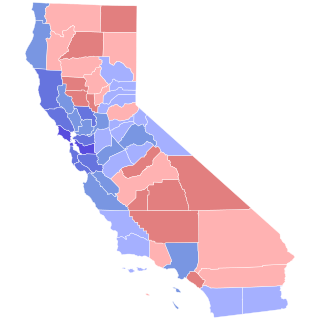
The 1992 United States Senate special election in California took place on November 3, 1992, at the same time as the regular election to the United States Senate in California. Feinstein defeated future California governor Gray Davis in the Democratic primary, while Seymour defeated William E. Dannemeyer in the Republican primary.

The 1990 United States Senate special election in Hawaii took place on November 4, 1990. Incumbent Democratic U.S. Senator Daniel Akaka was elected to finish the term ending in 1995. He had been appointed by Governor John Waihee in April 1990 to serve temporarily after the death of Spark Matsunaga. This was the best Republican performance in a U.S. Senate race in Hawaii where the Democrat won since Hiram Fong retired in 1976.

The 1990 United States Senate election in Virginia took place on November 5, 1990. Incumbent Republican U.S. Senator John W. Warner won re-election to a third term. No Democrat filed to run against him as he won every single county and city in the state with over 60% of the vote. Independent Nancy B. Spannaus got 18% of the vote, as she was the only other candidate on the ballot besides Warner.

The 1994 United States Senate election in Virginia was held November 8, 1994. Incumbent Democratic U.S. Senator Chuck Robb won re-election to a second term versus Republican nominee Oliver North, a Marine Corps veteran famous for his role in the Iran–Contra affair.
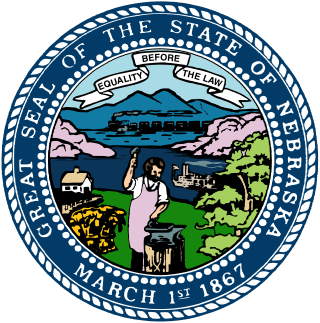
The 1984 United States Senate election in Nebraska was held on November 6, 1984. Incumbent Democratic U.S. Senator J. James Exon narrowly won re-election to a second term. This was despite Republican president Ronald Reagan carrying the state with more than 70% of the vote in the concurrent presidential election.
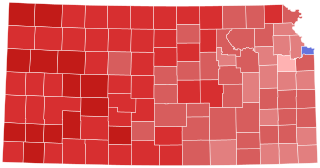
The 1996 United States Senate election in Kansas was held November 5, 1996. Incumbent Republican U.S. Senator Nancy Kassebaum decided to retire instead of seeking a fourth term. Republican Pat Roberts won the open seat.

The 2014 Kansas gubernatorial election took place on November 4, 2014, to elect the Governor of Kansas, concurrently with the election of Kansas' Class II U.S. Senate seat, as well as other elections to the United States Senate in other states and elections to the United States House of Representatives and various state and local elections.

The 1990 United States Senate election in Louisiana was held on October 6, 1990. In a nonpartisan blanket primary, incumbent Democrat J. Bennett Johnston won reelection to a fourth term, avoiding a runoff on November 6, 1990 by receiving 54% of the vote. Former Ku Klux Klan leader David Duke placed second, as the leading Republican challenger.

The 2020 United States Senate election in Kansas was held on November 3, 2020, to elect a member of the United States Senate to represent the State of Kansas, concurrently with the 2020 U.S. presidential election, as well as other elections to the United States Senate, elections to the United States House of Representatives and various state and local elections.

The 1978 United States Senate election in Kansas took place on November 7, 1978. Incumbent Republican Senator James B. Pearson did not run for re-election to a third full term.

The 1984 United States Senate election in Kansas was held on November 6, 1984.